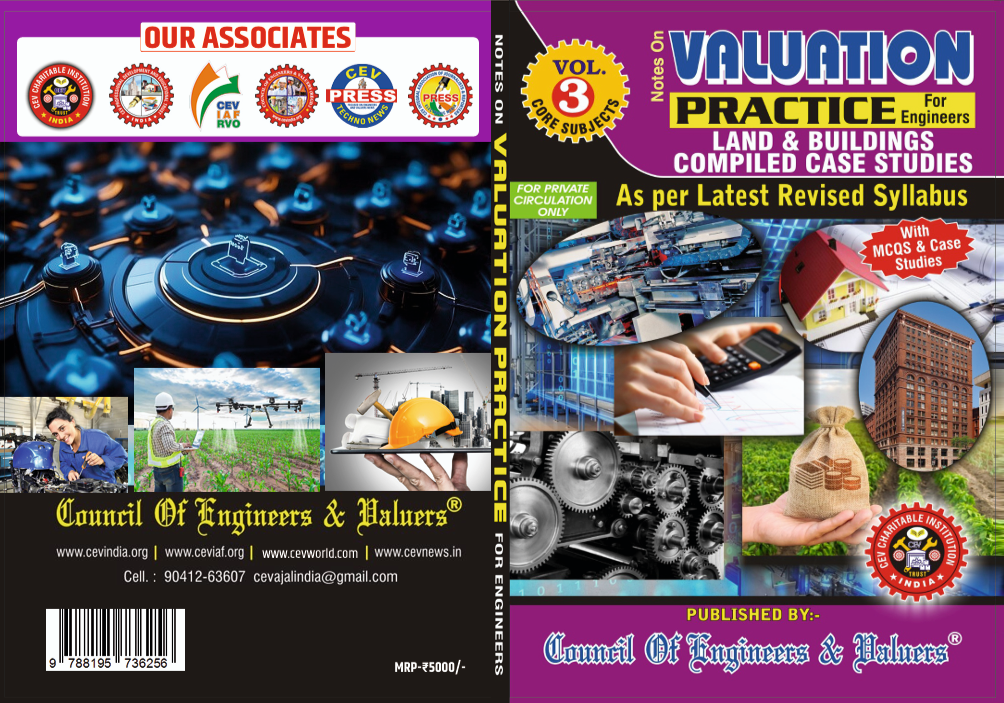SOME IMPORTANT CASE LAWS RELATED TO VALUATION PROFESSIONALS
NAVIGATING THE LEGAL LANDSCAPE
KEY JUDGMENTS EVERY VALUATION PROFESSIONAL MUST KNOW
By Er. Sundeep Bansal CEV Group | CEV IAF RVO | Council of Engineers and Valuers (CEV INDIA)
For IBBI Valuation Practice Aspirants & Registered Valuers
10 Court Cases Every Valuer in India Should Know
Did you know a valuer can’t be blamed for forged property papers? Or that they can’t be blacklisted without a fair hearing? These aren’t just professional opinions—they’re legal facts upheld by Indian courts. Here’s a quick tour of 10 powerful court decisions that every valuation expert should keep in their toolkit.
Highlights:
-
Not your job to check document authenticity – Madras HC says so.
-
Don’t touch title verifications – Leave it to the lawyers.
-
Forgery? Not your fault.
-
Negligence ≠ Crime. Proof is needed.
-
Blacklisted? Only with due process.
-
No quoting internal bank emails. Confidential means confidential.
Final Take:
Stay sharp. Know your limits. These judgments aren’t just legal trivia—they could save your license.
In an era of increasing scrutiny and regulatory oversight, the role of valuation professionals has grown more critical—and legally sensitive—than ever. Banks, financial institutions, insolvency professionals, and courts rely heavily on the assessments provided by registered valuers. However, legal precedents have clearly outlined the boundaries of their responsibilities.
Several high courts and the Supreme Court of India have delivered landmark judgments that clarify the legal position of valuers in relation to their duties, liabilities, and protections. Understanding these rulings is essential for professionals to navigate the complex interplay between valuation, law, and risk management.
Here’s a comprehensive look at 10 important case laws that valuation professionals should be aware of:
1. A Valuer Is Not Responsible for Verifying Document Genuineness
Case: L.N. Rajagopalan vs State
Court: Madras High Court | Date: 10.08.2009 | CRL.R.C.No. 1063 of 2008
In this landmark judgment, the court ruled that a valuer is not expected to test the authenticity of the documents provided. The valuer’s job is to assess the value based on the documents and data given. Scrutinizing the genuineness is the role of legal or investigative authorities.
2. No Authority to Certify Title Ownership
Case: Vijay Kumar Singh vs State of Bihar
Court: Patna High Court | Date: 10.12.2013 | Cr. Misc. No. 27162 of 2011 (6)
This ruling reiterates that a valuer is not a legal expert and cannot certify the legitimacy of ownership or title documents. Such certification is outside the scope of a valuation assignment and lies within the domain of legal professionals.
3. Forgery Detection Is Not a Valuer’s Duty
Case: Aparna Das vs Banks
Court: Kolkata High Court | Date: 19.08.2014 | W.P.No. 22699 (W) of 2014
Here, the court reinforced that a valuer is not responsible for identifying forged documents. This shields valuers from liability when forged materials are unknowingly relied upon, provided due diligence within professional standards is exercised.
4. No Obligation to Verify Land or Property Title
Case: Hemraj Phonsa vs CBI
Court: Special Judge – Anti-Corruption (CBI), J&K | Date: 11.12.2015
It was held that valuers should not be burdened with title verification responsibilities, which again belong in the legal domain. Assigning such obligations to valuers would be outside their training and regulatory guidelines.
5. Professional Negligence Is Not a Criminal Offense Without Evidence
Case: A. Kumar Sharma vs CBI
Court: Delhi High Court | Date: 09.02.2015 | CRL.M.C. 3302/2013
A significant ruling for the profession, this judgment clarified that mere professional negligence, without concrete evidence of criminal intent, does not warrant criminal charges against a valuer.
6. Criminal Liability Requires Active Fraud Participation
Case: CBI vs K. Narayana Rao
Court: Supreme Court of India | Date: 21.09.2012 | (2012) 9 SCC 512
The Supreme Court drew a clear line: a valuer is criminally liable only when actively involved in a conspiracy or fraudulent scheme. Passive errors or oversight are not sufficient to establish culpability in fraud cases.
7. Blacklisting Requires Due Process
Case: Mohanty & Associates vs UOI
Court: Orissa High Court | Date: 29.09.2014 | W.P. (C) No. 10647 of 2014
The court emphasized natural justice by ruling that blacklisting a valuer without notice and proper hearing is unjust and illegal. Institutions must follow procedural fairness before taking punitive action.
8. Guidelines Must Be Followed to Caution or Penalize Valuers
Case: W.P. (MD) No. 5404 of 2011
Court: Madras High Court | Date: 02.11.2011
Before referring a valuer to the Indian Banks’ Association (IBA) caution list, the court held that banks must strictly adhere to prescribed norms and internal guidelines, ensuring transparency and accountability.
9. Judicial Restraint in Contractual Matters
Case: R. Anbalagan vs Central Bank of India
Court: Madras High Court | Date: 29.01.2016 | Writ Appeal No. 728 of 2015
The judiciary reiterated that courts would not interfere in contractual matters unless the decision is arbitrary, unreasonable, or violates legal rights. Valuers operating under contractual terms with institutions must ensure their agreements are clear and balanced.
10. Internal Bank Correspondence Cannot Be Used in Disputes
Case: Sri Gorur Srinivas vs CBI
Court: Karnataka High Court | Date: 02.12.2014
In this case, the court ruled that valuers cannot rely on internal or confidential communication from banks to substantiate claims or grievances, reinforcing the principle of confidentiality and organizational protocol.
Awareness Is Protection
Valuation professionals are indispensable to the financial and real estate ecosystems. However, with increased reliance comes greater risk. These case laws act as a compass, offering much-needed clarity about the legal expectations and protections surrounding the profession.
As a best practice, valuers must:
-
Work strictly within the scope of their engagement.
-
Maintain comprehensive documentation of their methodology.
-
Avoid commenting on legal aspects like title verification.
-
Adhere to the code of conduct and relevant valuation standards.
-
Seek legal counsel when faced with potential disputes or legal notices.
With courts reinforcing that valuation professionals are not scapegoats for systemic failures, it is more important than ever for valuers to stay informed, stay ethical, and stay protected.



